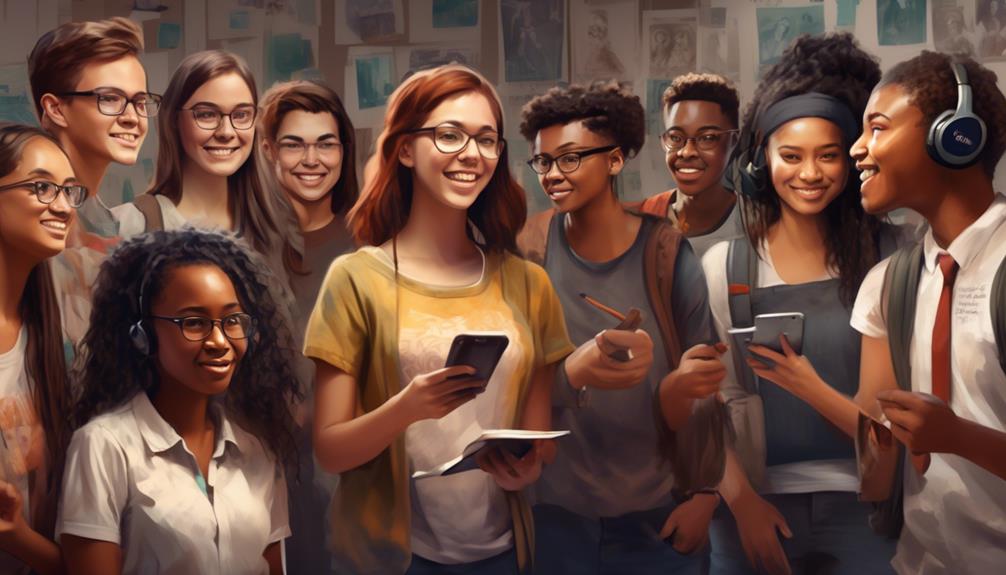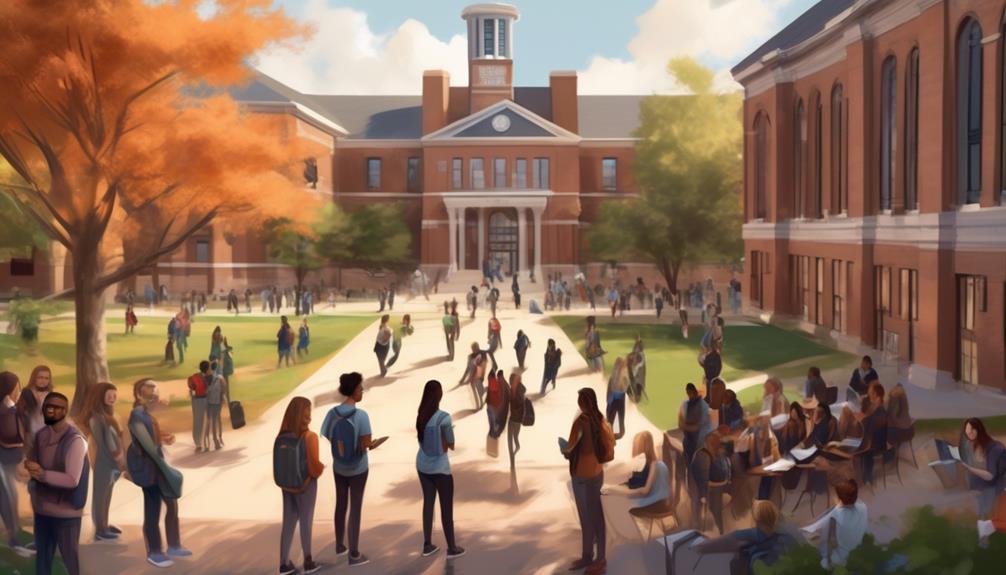We've all heard the statistic: nearly 70% of college students believe that personalized communication from their institution is important to their overall college experience.
But what does personalized communication really mean in higher education?
How can institutions effectively connect with students on an individual level to enhance engagement and support student success?
In this discussion, we'll explore the significance of personalized communication in higher education and uncover strategies for creating meaningful connections with students throughout their academic journey.
Key Takeaways
- Personalized communication is essential for attracting and retaining students in higher education.
- Utilizing CRM systems and effective list segmentation allows for tailored communication.
- Personalized ads across digital channels maximize the impact of marketing efforts.
- Customized virtual tours and tailored recruitment events create meaningful connections with prospective students.
The Role and Importance of Personalized Communication

Utilizing personalized communication is crucial for attracting and retaining students in higher education. Higher education institutions must recognize the significance of personalization in engaging prospective students at every stage of the admissions process.
Through customized messaging, personalized communication can significantly impact enrollment management and retention efforts. By leveraging higher education marketing strategies, institutions can create a digital experience that resonates with each individual, fostering a sense of connection and relevance.
Implementing CRM systems and effective list segmentation enables tailored communication that addresses the unique needs and interests of prospective students. This personalized approach revolutionizes traditional marketing practices, extending from print materials to digital experiences.
Moreover, personalized ads across various digital channels, such as Facebook and Google, allow for targeted outreach, maximizing the impact of marketing efforts.
Additionally, personalized recruitment events and post-admit communication, coupled with user-friendly student experiences, play a pivotal role in establishing meaningful connections and fostering a sense of belonging within the higher education community.
Implementing Personalized Communication Effectively
Recognizing the pivotal role of personalized communication in engaging prospective students, we can now focus on implementing these strategies effectively in higher education marketing.
To effectively implement personalized communication in higher education, we should:
- Utilize CRM systems and effective list segmentation to tailor personalized messaging to individual students, ensuring that the message resonates with their specific needs and expectations.
- Leverage personalized print marketing, digital viewbooks, and website personalization to create a customized experience for potential students, improving student engagement and interest in the institution.
- Employ paid campaigns and segmented digital ads, as well as personalized recruitment events and post-admit communication, to ensure that students receive a personalized and tailored approach throughout their admissions journey.
- Emphasize collaboration, user-friendly experiences, and tech-powered scalability to seize the opportunity for successful implementation of personalized communication strategies in higher education.
Examples of Successful Personalized Communication

Implementing personalized communication strategies has led to significant success in higher education marketing, demonstrating the power of tailored messaging in engaging prospective students.
For instance, virtual tours customized to individual student interests have been remarkably effective. By personalizing the virtual tour experience, we can showcase the aspects of campus life that resonate most with each student, creating a more compelling connection to the campus community.
Additionally, micro recruitment events tailored to specific student needs and interests have proven to be highly successful. These events provide a personalized experience, allowing prospective students to engage with admissions events that directly cater to their individual preferences and aspirations.
Furthermore, personalized messaging through digital ad channels has enabled higher education institutions to reach students with content that speaks directly to their interests and aspirations, leading to improved engagement and enrollment.
These examples illustrate the tangible impact of personalized communication in higher education, highlighting the effectiveness of tailored approaches in attracting and retaining students.
Leveraging Technology for Personalized Communication
We leverage advanced CRM systems and targeted segmentation to enable personalized communication strategies that resonate with each individual prospective student's unique needs and interests. By leveraging technology for personalized communication in higher education, colleges and universities can effectively reach and engage with students on a more personal level, ultimately increasing the likelihood of successful enrollment.
Here's how we do it:
- Utilize advanced CRM systems like HubSpot, Slate, Ellucian Recruit, and Target X to create a robust database for personalized communication.
- Implement effective list segmentation based on geographic location, type of high school, intended major, personal interests, etc., allowing for personalized messaging tailored to each recipient.
- Employ personalized print marketing to stand out among overwhelming print materials, using variable data printing to enable mass customization of text, layouts, and visuals in a single print run.
- Utilize effective segmentation to deliver personalized ads through various digital ad channels, such as Facebook, Instagram, Threads, and Google, tailored to each prospect's unique needs and preferences.
Customizing Communication for Diverse Audiences

To effectively customize communication for diverse audiences in higher education, it's essential to tailor messages to individual students, addressing their unique needs and interests. Personalization is crucial in meeting the higher expectations of Gen Z students and attracting and retaining them in college or university settings. As Chief Communications Officer, understanding the diverse audiences within the student body is paramount.
Utilizing CRM systems and segmenting audiences based on various criteria are key strategies in customizing communication. Incorporating dynamic insertion of custom values in personalized messages allows for a more tailored approach. Furthermore, personalized higher education marketing practices, such as variable data printing, digital viewbooks, and website personalization, can significantly impact conversion and revenue.
Paid campaigns and segmented digital ads, along with personalized recruitment events and user-friendly student experiences, play vital roles in reaching diverse audiences effectively. By customizing communication for diverse audiences, colleges and universities can provide quick access to relevant information and create a more inclusive and engaging environment for all students.
Personalization in Recruitment and Admissions
Revolutionizing traditional recruitment and admissions practices, personalization plays a crucial role in creating meaningful connections and fostering a positive impression of the institution. Here are four key ways in which personalization is transforming the recruitment and admissions process in higher education:
- Utilizing advanced CRM systems and effective list segmentation to craft personalized communication tailored to individual students, enhancing attention and awareness.
- Personalizing digital ad campaigns through effective segmentation, ensuring that ads targeting prospects reflect their unique needs and preferences.
- Hosting micro recruitment events that cater to specific student interests, fostering a sense of belonging and personal connection to the virtual campus.
- Tailoring post-admit communications to address individual prospects' needs, ensuring that students feel valued and supported from the moment they express interest in the institution.
Measuring the Impact of Personalized Communication

Measuring the impact of personalized communication in higher education is essential for understanding its effectiveness in attracting and retaining students. By evaluating the success or failure of personalized communication efforts, higher education institutions can adapt their strategies to better meet students' specific needs. This assessment allows for the identification of which personalized communication methods are most successful in increasing student enrollment, engagement, and retention.
One crucial aspect to measure is the impact of personalized communication on financial aid awareness and utilization. By analyzing the response to personalized messages regarding financial aid options, institutions can better understand how to communicate this vital information effectively. Additionally, tracking the engagement and response rates to personalized communication can provide insights into students' preferences and behaviors, aiding in refining future communication strategies.
Furthermore, measuring the impact of personalized communication can help higher education institutions determine the return on investment for their communication efforts. By understanding the effectiveness of personalized communication in attracting and retaining students, institutions can allocate resources more efficiently and maximize the impact of their outreach efforts.
Frequently Asked Questions
What Is Personalized Learning in Higher Education?
We believe personalized learning in higher education tailors the educational experience to individual student needs and interests, enhancing engagement. It involves utilizing technology and data to create customized educational pathways, content, and support for students.
What Is Personalized Communication?
Personalized communication is tailoring messages to individual recipients. It fosters strong relationships and increases engagement. Through effective use of CRM systems and list segmentation, we craft personalized content that resonates with each person, driving enrollment and success.
Why Is Communication Important in Higher Education?
Communication is crucial in higher education because it helps meet students' needs, provides quick access to relevant information, and reduces friction in the student journey. Institutions must connect with students as individuals to stay competitive.
Why Do Customers Respond so Positively to Personalised Communication?
Customers respond positively to personalized communication because it makes them feel valued and understood. Tailoring messages to their specific needs and preferences demonstrates a genuine interest in their individual experiences, leading to better engagement and satisfaction.
Conclusion
In conclusion, personalized communication in higher education is the key to unlocking a more positive and engaging experience for students. By tailoring our approach to meet the diverse needs of individuals, we can create a seamless journey that keeps students connected and informed.
Embracing technology and collaboration, we can continue to meet the higher expectations of students and stay competitive in the ever-evolving landscape of higher education. It's all about making students feel seen and heard, and that's something we're committed to.




